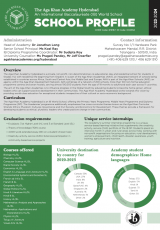Wellness Corner - Be Your Greatest Advocate
Last month I talked about the importance of paying attention to the language we use when talking to other people. Inspired by psychologist Dr Jane Nelsen I advocated for more conscious use of positive language; that is, replacing statements like “stop shouting” and “no hitting” with positively framed alternatives like “quiet voice, please” and “hands to ourselves”. Just as impactful as how we talk to others, however, is the language we use to speak to ourselves – the language of our thoughts.
“You’ll never be good enough” | “You should just quit”
Imagine hearing these statements from a close friend. How would you feel? How might you decide to act? Perhaps it’s hard to even imagine a friend saying these things. Why is it then that we say these kinds of things to ourselves? I know I do sometimes. In moments of stress and challenge, in particular, it feels all too easy, habitual even, to fall into these negative thinking habits – being overly critical of myself and at times comparing myself negatively to others.
Like the words we hear from others, our internal dialogue has the potential to inspire vastly different actions. Yet unlike the language we receive, of which we have little control, we have a choice about how we speak to ourselves. Over this next week, and the weeks that follow, I invite you to notice the language of your inner thoughts and to ask yourself: “would I say this to a friend’? As we become more aware of our self-talk, we can gradually learn to replace unhelpful thoughts and words with more positive talk – that is, to practice mindful self-compassion. Mindful self-compassion is the practice of talking to ourselves (and more than that being with ourselves) as we would a close friend.
“Keep trying, you’ll get there” | “You can do it”
Along the way, I encourage you not to be too hard on yourself. In other words, when you notice negative self-talk, resist the urge or at least smile at the inclination to load yet more negativity on top of whatever it is you’ve already said. Instead of “I shouldn’t be talking to myself like that”, how about something a little gentler... taking a few deep breaths, in and out, ask yourself “what would my greatest advocate and most compassionate friend say to me right now?”
Feeling worried that self-compassion might be letting yourself off the hook too easily? Read more about the science behind this practice from Dr Kristen Neff below.
https://greatergood.berkeley.edu/article/item/the_five_myths_of_self_compassion





